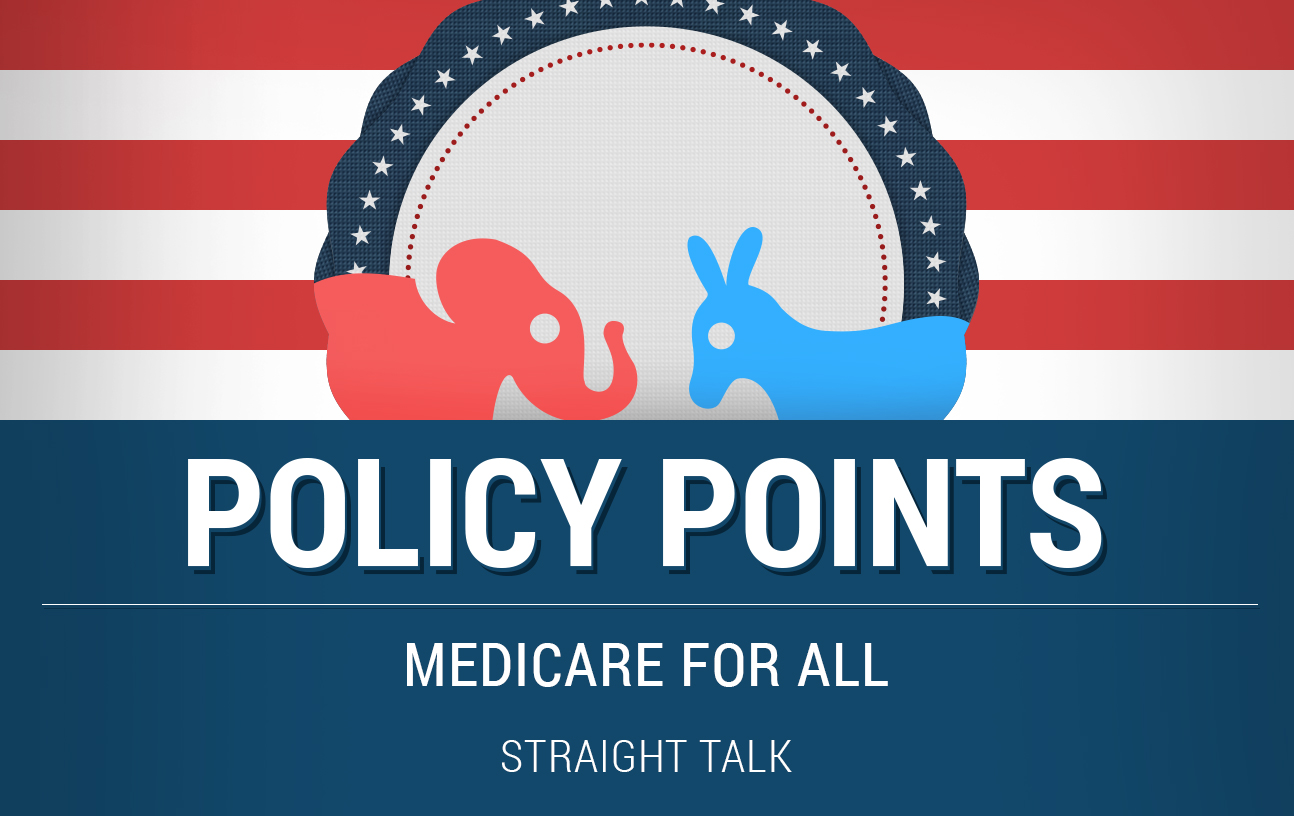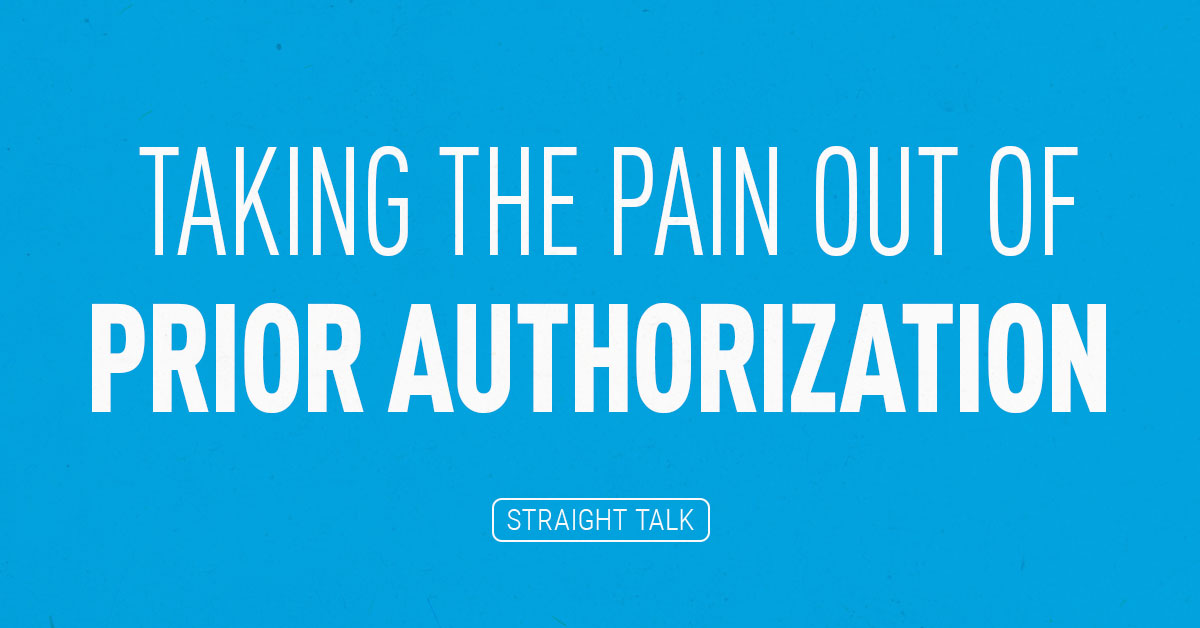Blue Cross is looking at the public healthcare policy statements presidential candidates are making and Straight Talk’s Mike Bertaut will shed some light on the realities of some of these policies from his own perspective.
Continuing in the tradition of giving our presidential candidates’ talking points the Straight Talk treatment, I’d like to explore with you today an intriguing idea: MEDICARE For All — One candidate suggests we just take the Medicare program, which today covers seniors and certain others, and apply that to all Americans.
To really give this one a go, it’s important that we set a baseline for exactly what Medicare is, where it came from, and how it is funded. So let’s go back in time just a little bit, to 1965. That was when Congress enacted, and President Lyndon Johnson signed, the expansion of Title XVIII (18) of the Social Security Act that was named “Medicare.” As originally envisioned, Medicare was a program designed to do three things:
- Create a mechanism for payroll deductions throughout the career of a worker to create a trust fund.
- Create a social health insurance program for people over 65 years of age with the trust fund.
- To use the financial strength of the program to desegregate thousands of hospitals and physician practices around the country that previously were racially segregated. Only medical facilities willing to integrate could get paid by the program.
As a financial modeler, I am always reminded to keep my humility close by when I examine the performance of the original Medicare projections. In 1965, forecasters estimated that by 2015 the Medicare program would cost roughly 1.5% of all the payroll for all working Americans. The actual number today is pushing 3%! That’s a pretty big miss! This is a good time to remember “Bertaut’s Law,” which says the following:
“No matter how strictly disciplined your research is, no matter how meticulous your modeling becomes, everything costs more than you expect. Everything.”
So all of us out there in the world working, from the time we have our first real job with a paycheck (for me that was age 15) until we turn 65 years old, we are contributing 1.5% of our paychecks (half from us, half from our employer) into the Medicare Trust Fund. We are pre-funding the program throughout our working lives. (Contrast that with the Medicaid program, which has no trust fund but is a pay-as-you-go (PAYGO) program). So with Medicare, we kick money in for a very long time before we actually take any out.
Over the years, Medicare has been called upon to cover other things that have nothing to do with turning 65 years old. For example, people with certain disabilities can get Medicare at any age, likewise folks with kidney failure. These programs are important to provide healthcare for people who really need it, but the Medicare recipients from these groups often cost double or triple the amount Medicare spends for the average senior’s healthcare.
Today, Medicare pays for healthcare through four different types of programs:
- Medicare Part A—hospital coverage. Free if you have contributed your 1.5% for at least 40 quarters of work during your lifetime.
- Medicare Part B—physician coverage. You must pay a small premium for this coverage that is income based, but for most folks it is around $125 a month in 2016.
- Medicare Part D—prescription drug coverage. This is managed by private insurance companies, which are funded by Medicare plus the premiums they collect from members; and
- Medicare Advantage—this replaced Medicare with a private alternative, subsidized heavily by the federal government. You can also buy private wrap-around subsidies for Medicare Part A/B called “supplements.”
Now that you should have a basic grounding in Medicare, I’m betting you can already see some reasons why the notion of “Medicare for All” might be problematic. Here are the challenges I’ve identified:
First of all, most people in Medicare kicked in money out of their paychecks for decades before they were eligible to draw out any benefits. This ensures a long-term, stable fund to pay for their healthcare as they age out of the workforce. If the program starts taking people of every age who have contributed very little, a very large transfer of funds is going to have to find its way into federal coffers. That means big-time taxes if you are going to insure everyone. In the United Kingdom, for example, they fund their national health service with a Value-Added Tax on every single transaction in the entire nation of 17.5%. Imagine if you had to pay 17.5% extra every time you bought ANYTHING, every time an item moved from a wholesaler to a retailer.
Second, a recent Cato Institute study quoted at www.Politifact.com showed that seniors in the current Medicare program contributed an average of $122,000 over their lifetimes of earnings, and their expected “draw” from the program as they age will be around $387,000! That’s why the Kaiser Family Foundation said recently Medicare’s hospital trust fund (Part A) would run dry by 2030. It’s already on a bit of a downward spiral even populated with people who have been paying in for 40 years or more, so how’s it going to survive when people can just jump in at birth? That’s a tough one.
Over the years, Medicare has been called upon to cover other things that have nothing to do with turning 65 years old. For example, people with certain disabilities can get Medicare at any age, likewise folks with kidney failure. These programs are important to provide healthcare for people who really need it, but the Medicare recipients from these groups often cost double or triple the amount Medicare spends for the average senior’s healthcare.
Third, there are currently around 60 million Americans who are members of their state’s Medicaid programs. When these patients access medical care, the program pays docs and hospitals around 70% of what Medicare pays when seniors access those same services, and even at those discounted payment rates, states are struggling mightily to fund their Medicaid programs. What happens when those 60 million are enrolled in “Medicare for All,” and the payment scales to providers increase by 40-50%? Where is THAT money going to come from?
One obvious source of these billions would be that the money currently purchasing private insurance by companies and individuals would find its way into Washington, D.C. coffers through some new taxes. In addition, this would eliminate the billions in tax breaks businesses get by acting responsibly and providing health insurance for their employees. People must forsake their Blue Cross, and then a large enough tax must be put into place to make sure that all that money these people were paying in premiums (with pre-tax dollars if they got the coverage through their employer) now finds its way into the government’s Medicare fund. That’s about $900 billion a year minimum in premiums, and another $250 billion that must be converted to taxes or fees of some kind. Can you imagine the disruption compared to how we’re used to healthcare working? I’m struggling with it myself.
The final argument I’ve been hit with in favor of Medicare for All goes like this: “Mike, you know the Medicare program is MUCH more efficient than private insurance companies! You spend like 15 or 20% of premiums every year just on plain OVERHEAD, and Medicare only spends about 4%. Look at all the money we’ll save if we can just cut you guys out!” Ah, an oldie but a goodie! Just one small problem.
Medicare’s 4% overhead is the OFFICIAL amount they spend to run the program. Sadly, the FBI and the Government Accountability Office both say that Medicare is so easy to defraud and cheat that at least $60 billion a year leaks out of the program in fraud, abuse and waste. If we actually count that $60 billion as an expense, then Medicare gives zero administrative cost savings over private insurance. And while private insurers pay billions a year in taxes as a part of their overhead, Medicare pays none.
… (T)he Kaiser Family Foundation said recently Medicare’s hospital trust fund (Part A) would run dry by 2030.
So while Medicare for All really sounds attractive and all the seniors I know on Medicare are pretty happy with it, the reality is they EARNED it by contributing to the fund for their entire lives and hanging on until they turned 65. Taking that type of program and trying to make it something you are just born into is going to be VERY challenging, expensive and unimaginably disruptive.
Or in the words of Emory University Economist Kevin Thorpe, “Under the current Medicare for All proposal, 71% of working Americans would pay more in taxes than they are currently paying in healthcare insurance and out-of-pocket costs.”
I don’t know anyone who is anxious to spend even MORE money on their healthcare than they are already.




